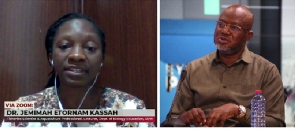 Jemimah Etornam and Kassah Richster Nii Amarh Amarfio in a photo collage
Jemimah Etornam and Kassah Richster Nii Amarh Amarfio in a photo collage
Experts have lauded efforts in recent years aimed at redeeming Ghana’s ailing fisheries sector which have led to some positive results, one of which is the imminent reversal of Ghana’s yellow card status. Yet, many maintain that Ghana’s fisheries sector has a long way to go so far as sustainable management is concerned.
Two such commentators on the state of Ghana’s fisheries are Richster Nii Amarh Amarfio, the Executive Director of Blue Economy and Governance Consult, and Dr. Jemimah Etornam Kassah a Fisheries Scientist and Aquaculture Professional who were speaking on the Eye on Port program.
The latter who described Ghana’s fisheries as “currently undergoing surgery”, identified a number of interventions that have brought some respite to the sector.
“The fisheries sector was bedeviled with a lot of challenges and our small pelagic, were in a state of near collapse but in the past 3-4 years, a lot of interventions like the close season, an attempt to reduce the number of vessels going into the sea was introduced. There has been a reduction in the number of trawl vessels, and canoes are also registered and licensed. We have moved from that point where the fisheries were being rushed to the hospital to the hospitalization stage where a series of interventions are being put in place to ensure that we move away from the dire situation we found ourselves in.”
Dr. Kassah, who is a lecturer at the Department of Biology Education at the University of Education, Winneba, said the most notorious bane to the sector is the problem of pollution.
She said in addition to the incessant plastic pollution destroying aquatic life and biodiversity, is the menacing threat of heavy metals from unregulated mining activities.
“We are taking for granted the increasing time bomb we are sitting on, that is the heavy metal pollution from our rivers and discharging directly into the ocean already laden with mercury from our alluvial mining activity, as well as other dangerous compounds.”
The academic was also wary of climatic conditions affecting fishing activities calling for deliberate attention in that area.
She cited the ongoing “El Nino” phenomenon emerging from the Pacific, which has created turbulent waters negatively affecting fishing activities.
“Although August is a time where fishermen were poised to land more fish or get increased catch, the waters were too rough,” she expressed.
Dr. Kassah who provides training and consultancy services for Aquaculture development lamented some regulation gaps in the sector.
“We don’t have regulations spelling out how many people we are allowing to go into aquaculture per year or in terms of production statistics, how many volumes are allowed to be harvested per a given period.”
She says the lack of adequate regulation has left the nation’s water bodies with untapped potential and the glaring gap in research is evident.
The Fisheries Scientist said regulations being called for should also consider sustainability strategies that protect the livelihoods of fishers in the artisanal sector, who are reeling from current events in the industry.
“We need to relieve our fishers from handouts and subsidies
She called for increased government in commitment to the sciences in areas of scientific research particularly in acquiring a research vessel to guide policies in the sector.
The Executive Director of the Blue Economy and Governance Consult, Richster Nii Amarh Amarfio, called for regulatory legislative instruments that is management-centered to strengthen the Fisheries Act.
“The Act in itself establishes the Fisheries Commission and shows what the Commission should do, but it is inadequate in itself. Even when you write a new law, you will need to write a number of regulations to determine how the Commission functions and the rules governing the activities in the sector in order to manage the resources properly so that the challenges, Dr. Kassah enumerated will be able to dealt with,” he explained.
He said new regulatory laws will take into consideration fisheries management strategies such as close season and the functions and responsibilities of all stakeholders for such strategies.
Again, the regulations he’s proposing will consider fine-tuning management of the fisheries development fund to be more specific.
“Fisheries Commission used to take 100% of their Internal Generated Funds but now a percentage is paid to the commission. You need a regulation to deal with some of these things,” he said.
Richster Nii Amarh Amarfio who gave due credit to Ghana’s fisheries hierarchy for recent efforts such as an end to illegal fish transhipment (SAIKO) remained emphatic in his call for the rewriting of the Ghana Fisheries Law to encompass management issues correspondent to emerging issues, so as Ghana can reap the full benefit of one of its viable natural resources.